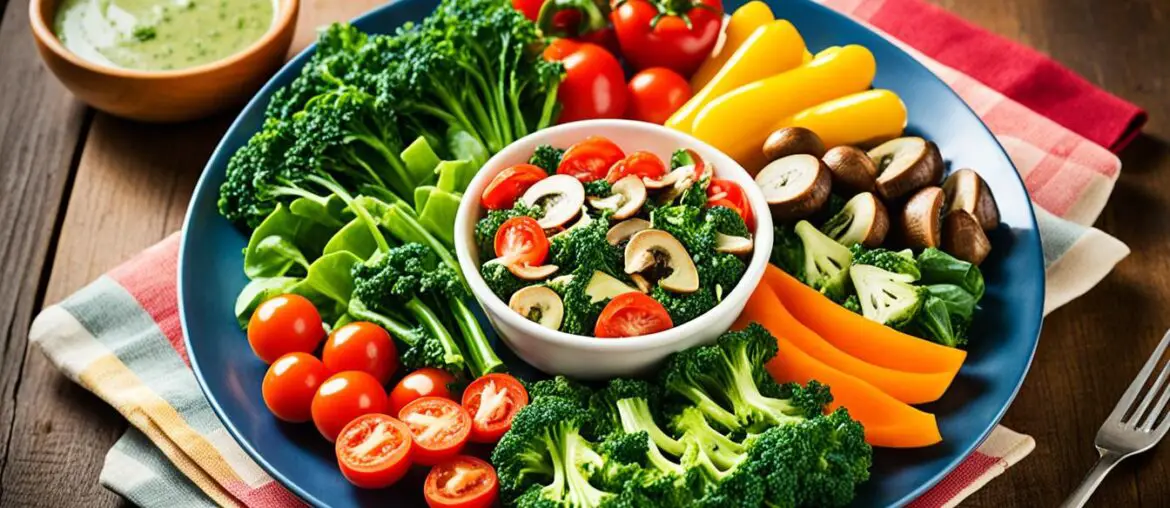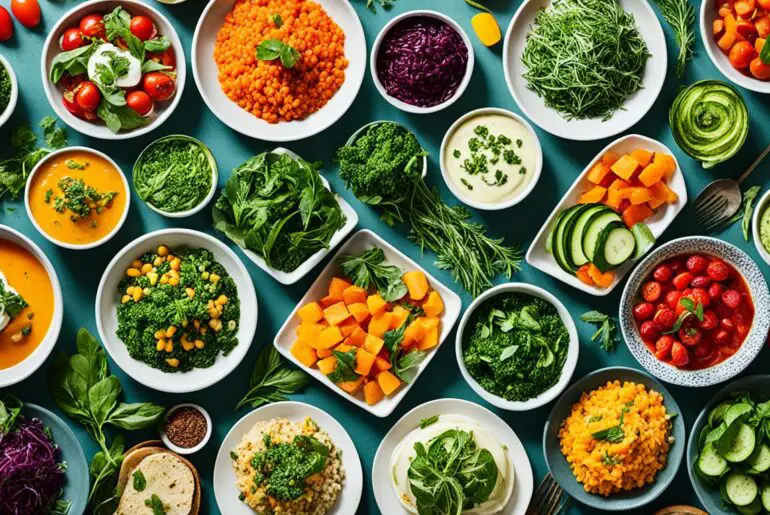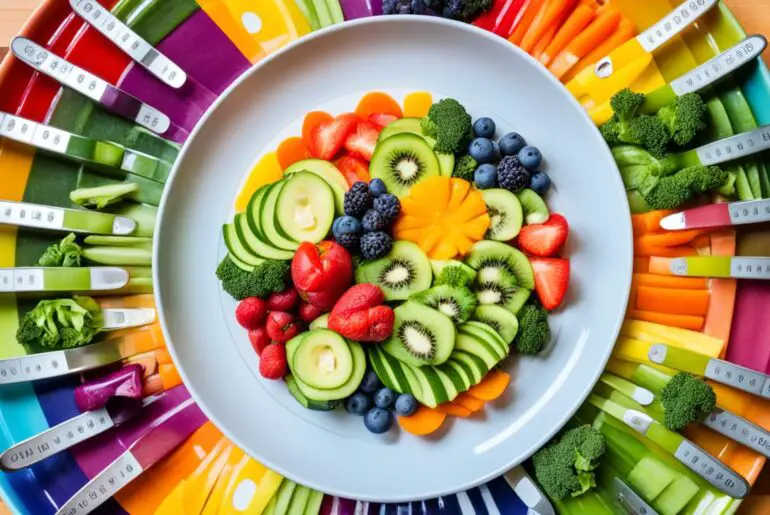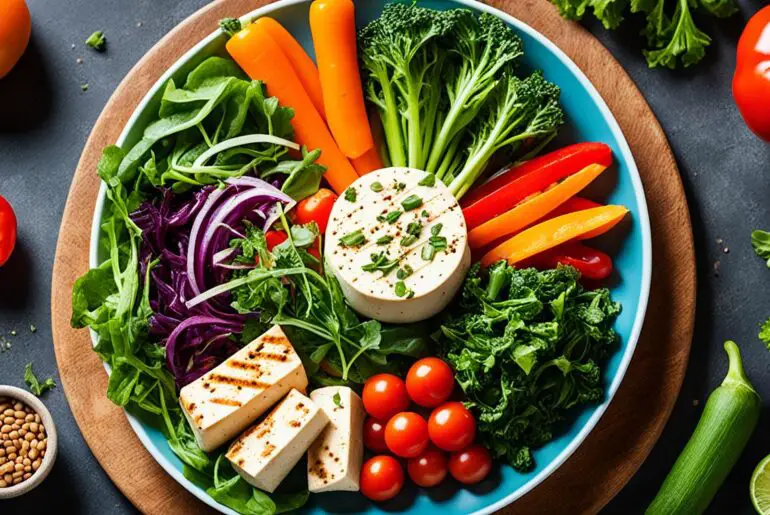When it comes to weight loss, the HCG diet is often associated with consuming lean meats to achieve rapid results. But what about vegetarians? Can they follow the HCG diet and still achieve their weight loss goals? The answer is yes!
Contrary to popular belief, vegetarians can adapt the HCG diet to their plant-based lifestyle and experience the same weight loss success. By making a few simple substitutions and being mindful of their protein intake, vegetarians can embark on this meat-free weight loss journey and achieve remarkable results.
So, how exactly can vegetarians follow the HCG diet? What are the best vegetarian sources of protein to substitute meat? And are there any challenges they might face along the way? Let’s explore these questions and more as we delve into the HCG Diet Protocol for Vegetarians.
Key Takeaways:
- Vegetarians can successfully follow the HCG diet by making simple substitutions and being mindful of their protein intake.
- Plant-based protein sources such as tofu, tempeh, and cottage cheese can serve as excellent alternatives to meat.
- Consulting with a healthcare provider or weight loss professional is crucial for personalized guidance and support throughout the diet journey.
- Following the recommended guidelines and making appropriate food choices can help vegetarians achieve weight loss results comparable to the traditional HCG diet.
- By adapting the HCG diet to their vegetarian lifestyle, individuals can experience rapid weight loss and increased energy levels.
The Importance of Protein on the HCG Diet
Adequate protein intake is crucial for achieving weight loss on the HCG diet. Protein plays a significant role in moderating hunger hormones, reducing appetite, and promoting better food choices. While the traditional HCG diet includes lean protein from meat sources, vegetarians can still meet their protein needs by substituting meat protein with vegetarian or vegan sources.
Substituting 30g of meat protein with 30g of vegetarian or vegan protein is recommended to maintain appropriate protein intake on the HCG diet. Luckily, there are plenty of vegetarian sources of protein available that are suitable for the HCG diet:
- Cottage cheese
- Protein powder
- Tofu
- Tempeh
- Miso soup
- Eggs
These vegetarian sources of protein provide the necessary amino acids and contribute to a balanced diet while staying within the calorie restrictions of the HCG diet.
Vegetarian Options on the HCG Diet
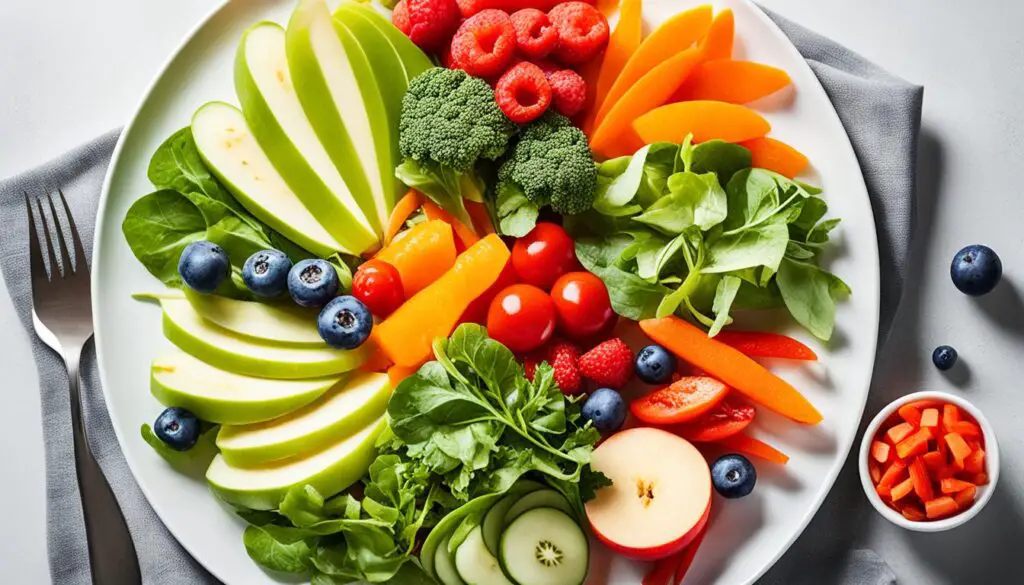
The HCG diet program offers a nutrition plan that can be customized for vegetarian diets, providing plant-based alternatives without compromising on protein intake. While lacto-ovo vegetarians can easily replace meat options with fish, vegetarians who do not consume fish still have a wide range of high-protein, vegetarian-friendly foods to choose from. These options not only meet the protein requirements but also stay within the calorie restrictions of the HCG diet.
Here are some vegetarian options that can be incorporated into the HCG diet:
- Cottage cheese
- Protein powder
- Tofu
- Tempeh
- Miso soup
- Eggs
These plant-based alternatives are rich in protein and provide the necessary nutrients while following the calorie restrictions of the HCG diet. Including these options in your meal plan ensures that you stay on track with your vegetarian-friendly approach to the HCG diet.
“By incorporating vegetarian-friendly options into the HCG diet, individuals can ensure they are meeting their protein needs while following the program’s guidelines.”
Vegetarian-Friendly Foods on the HCG Diet
Vegetarian-friendly foods on the HCG diet provide a variety of options to suit different taste preferences and dietary restrictions. The following table outlines the nutritional composition of some vegetarian HCG diet options:
| Foods | Protein Content per Serving | Calories per Serving |
|---|---|---|
| Cottage Cheese (1/2 cup) | 14g | 104 |
| Protein Powder (1 scoop) | 20g | 90 |
| Tofu (3 ounces) | 8g | 70 |
| Tempeh (3 ounces) | 15g | 162 |
| Miso Soup (1 cup) | 2g | 36 |
| Eggs (2 large) | 13g | 140 |
These vegetarian-friendly options provide a range of protein content and calorie values, allowing individuals to tailor their HCG diet plan according to their specific needs and goals.
Vegan Options on the HCG Diet
While the HCG diet can be more challenging for vegans, there are still viable options available. As a vegan on the HCG diet, it’s important to find plant-based alternatives that meet your protein requirements and help you stay on track with your weight loss goals.
Plant-Based Protein Sources
To replace the meat protein on the HCG diet, vegans can turn to soy products such as tofu and tempeh. These versatile plant-based foods provide a good amount of protein while keeping you within the calorie restrictions of the diet. Incorporating them into your meals can help you stay satiated and maintain muscle mass while losing weight.
Additionally, opting for vegan protein powders can help ensure that you’re getting enough protein throughout the day. Look for powders made from ingredients like pea protein, hemp protein, or brown rice protein, as these are excellent vegan-friendly options.
Probiotics for Gut Health
Gut health is crucial for overall well-being, and on the vegan version of the HCG diet, including probiotics in your diet becomes even more important. Probiotics can help control gut bacteria and minimize food cravings, allowing you to stay on track with the diet. You can find probiotics in vegan-friendly fermented foods like sauerkraut, kimchi, and kombucha.
Reading Labels for Optimal Results
When following the vegan HCG diet, it’s essential to read labels carefully to avoid excessive sugar and fat consumption. Many processed vegan-friendly products may contain added sugars or unhealthy fats that can hinder your weight loss progress. Opt for whole, unprocessed foods whenever possible and be mindful of hidden sugars and unhealthy oils in packaged products.
Overall, while the vegan version of the HCG diet may require some extra diligence and creativity, it is still possible to achieve successful weight loss by utilizing plant-based alternatives and making conscious food choices. By incorporating soy products, vegan protein powders, and probiotics into your diet, you can stay on track with your goals while enjoying a vegan lifestyle.
Weight Loss for Vegetarians on the HCG Diet
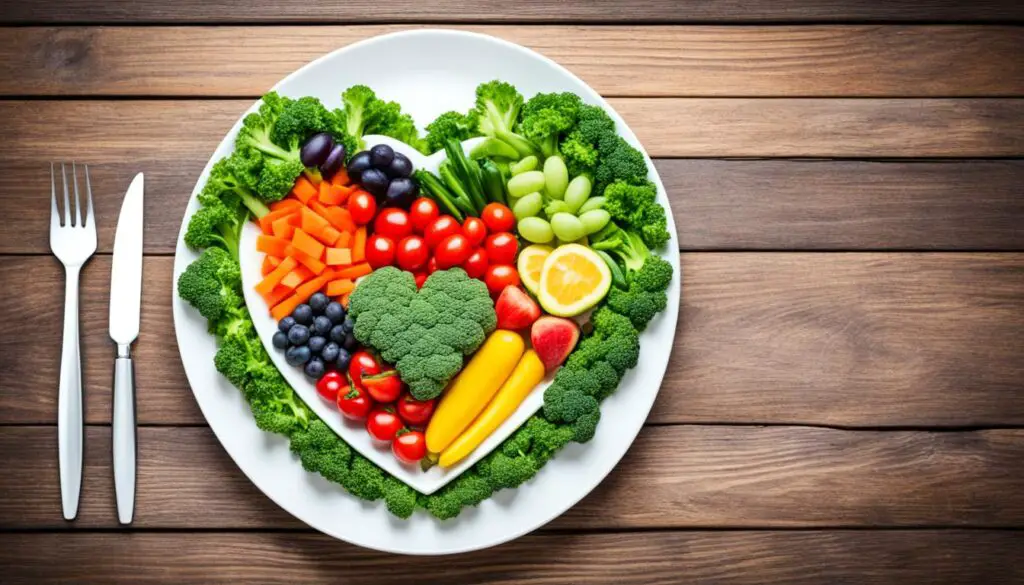
Weight loss for vegetarians on the HCG diet follows the same principles as the traditional HCG diet. The key to success is a low-calorie diet that eliminates sugar, refined carbs, and excessive fat. As a vegetarian, you can tailor the diet to your dietary preferences by substituting meat protein with vegetarian or vegan sources. By following the recommended calorie requirements and making appropriate substitutions, you can achieve rapid weight loss and experience increased energy levels.
The vegetarian-friendly weight loss on the HCG diet offers an effective solution for individuals who follow a meat-free diet. By making smart food choices and adhering to the guidelines of the diet protocol, vegetarians can achieve significant weight loss results.
Benefits of Vegetarian-Friendly Weight Loss on the HCG Diet
Embarking on a vegetarian-friendly weight loss journey on the HCG diet not only helps you shed excess pounds but also offers several additional benefits. Here are some advantages you can expect:
- Improved digestion and gut health
- Increased consumption of nutrient-rich fruits and vegetables
- Reduced risk of cardiovascular diseases
- Support for sustainable, plant-based eating habits
Meal Substitutions for Vegetarians on the HCG Diet
As a vegetarian, you may need to make protein substitutions to meet your nutritional needs while following the HCG diet. Here are some excellent vegetarian-friendly options:
| Protein Source | Protein Content (per 100g) |
|---|---|
| Cottage Cheese | 11g |
| Protein Powder | 20-25g |
| Tofu | 8g |
| Tempeh | 19g |
| Miso Soup | 3g |
| Eggs | 6g |
By incorporating these protein-rich vegetarian alternatives into your HCG diet plan, you can maintain muscle mass and support your weight loss goals.
Success for vegetarians on the HCG diet lies in the ability to adapt and customize the meal plan to meet individual dietary restrictions. With the right protein substitutes, vegetarians can experience significant weight loss and enjoy a plant-based approach to the HCG diet.
Whether you’re following a vegetarian diet for ethical, health, or personal reasons, the HCG diet can be a successful weight loss method for you. By adhering to the diet protocol, incorporating vegetarian-friendly protein sources, and keeping your calorie intake in check, you can achieve your weight loss goals and experience the transformative power of the HCG diet.
Challenges and Solutions for Vegetarians on the HCG Diet
As a vegetarian on the HCG diet, there are certain challenges that you may face, particularly when it comes to finding suitable meat protein replacements. Many vegetarian-friendly sources, such as nuts and legumes, are high in fat and calories, making them unsuitable for the strict calorie restrictions of the diet. However, there are viable solutions that can help you overcome these obstacles and stay on track with your weight loss goals.
“Finding suitable meat protein replacements can be a challenge for vegetarians on the HCG diet, but with the right solutions, it is possible to achieve success.”
One solution for vegetarians on the HCG diet is to consider organic milk as a protein substitute. Organic milk is a rich source of protein and can provide the necessary nutrients while still fitting within the calorie restrictions of the diet. It is important to choose organic milk to avoid unnecessary additives and hormones.
In addition to finding alternative protein sources, vegetarians on the HCG diet may need to consider vitamin supplementation to fill nutritional gaps. Since the diet is low in calories, it is important to ensure that you are getting all the necessary vitamins and minerals to support your overall health. Consulting with a healthcare provider can help you determine which supplements are appropriate for you.
Overcoming the challenges of being a vegetarian on the HCG diet requires careful planning and consideration. By finding suitable protein substitutes, such as organic milk, and ensuring adequate vitamin intake through supplementation, you can successfully navigate the diet and achieve your weight loss goals.
Protein Options for Vegetarians on the HCG Diet
| Protein Source | Protein Content per Serving | Calories per Serving |
|---|---|---|
| Cottage Cheese (low-fat) | 20g | 80 |
| Protein Powder (vegetarian/vegan) | 20g | 100 |
| Tofu | 10g | 70 |
| Tempeh | 15g | 120 |
| Miso Soup | 8g | 60 |
| Eggs | 6g | 70 |
By incorporating these protein options into your vegetarian HCG diet plan, you can ensure that you meet your daily protein requirements while following the guidelines of the diet.
Remember, it is essential to consult with a healthcare provider or a weight loss professional for personalized advice and recommendations specific to your dietary needs.
The Phases of the Vegetarian HCG Diet
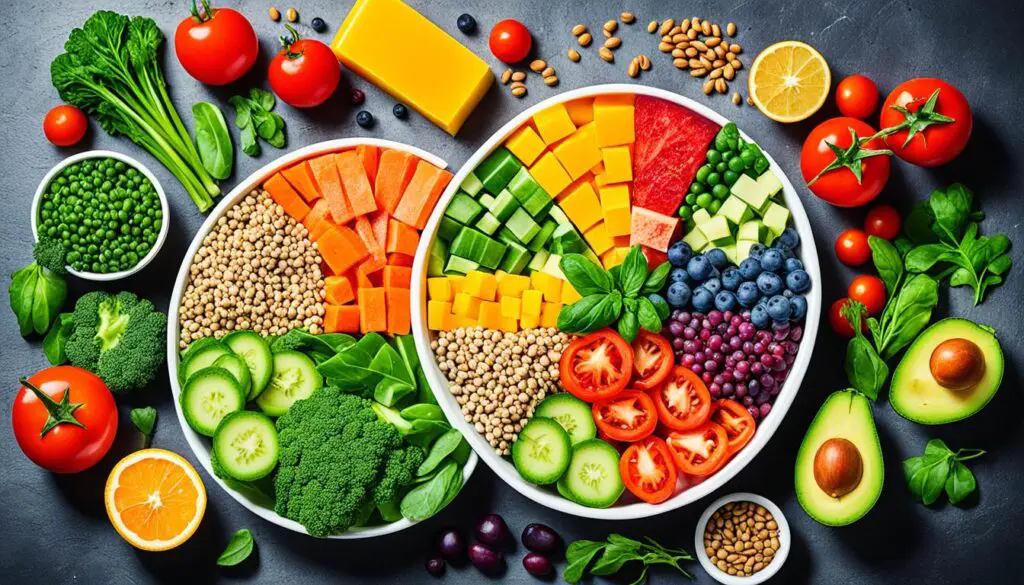
The vegetarian HCG diet follows a structured approach with three main phases: the loading phase, the weight loss phase, and the maintenance phase. Each phase is crucial for achieving successful weight loss and maintaining it in the long term.
The Loading Phase:
During the loading phase, participants consume calorie-dense foods to build up fat stores in preparation for the subsequent weight loss phase. This phase typically lasts for two days and involves enjoying high-fat, high-calorie foods.
The Weight Loss Phase:
The weight loss phase is the core of the vegetarian HCG diet plan. It typically lasts for three to six weeks, depending on individual goals. During this phase, participants adhere to a restricted calorie intake, usually around 500-800 calories per day, while also receiving HCG injections or taking HCG drops. The combination of the low-calorie diet and HCG helps stimulate metabolism and supports fat burning while preserving muscle mass.
The Maintenance Phase:
The maintenance phase is all about transitioning to a sustainable and healthy eating pattern for long-term weight management. In this phase, participants gradually increase their calorie intake and reintroduce certain foods back into their diet. The duration of the maintenance phase varies from person to person but typically lasts for three weeks.
Vegetarians following the HCG diet can adapt the meal plan by replacing meat proteins with suitable alternatives, such as plant-based protein sources. Organic dairy products, like cottage cheese and yogurt, can also be included in the vegetarian HCG diet plan during the maintenance phase.
| Phase | Description |
|---|---|
| Loading Phase | Consuming calorie-dense foods to build up fat stores. |
| Weight Loss Phase | Following a restricted calorie intake while receiving HCG injections for effective weight loss. |
| Maintenance Phase | Transitioning to a sustainable eating pattern and gradually reintroducing certain foods. |
Vegetarian HCG Diet Plan
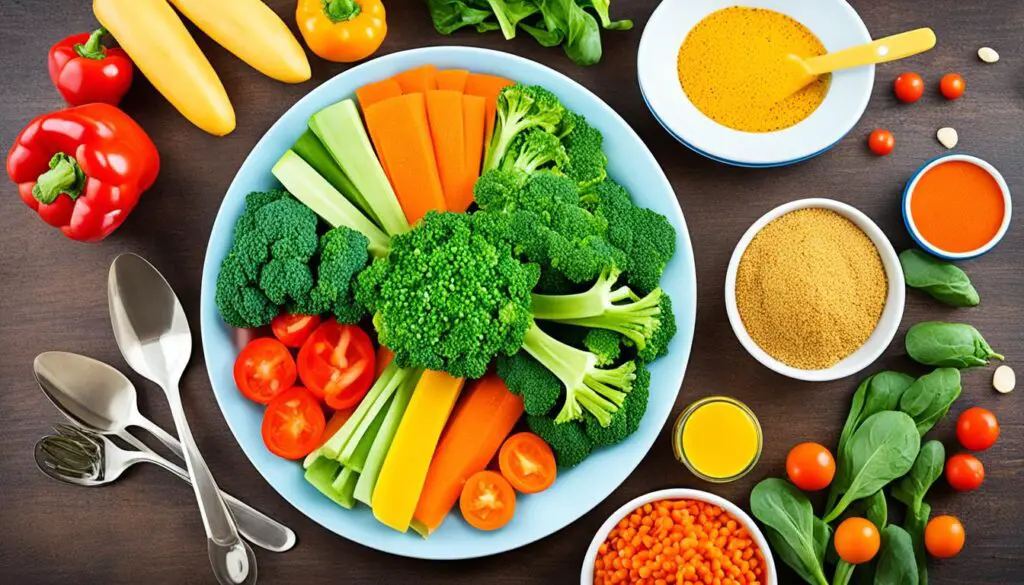
When following the vegetarian HCG diet, it’s important to have a well-planned meal plan that provides all the necessary nutrients. Here is a sample vegetarian HCG diet plan that includes a variety of protein sources, vegetables, fruits, and beverages:
- Protein sources: Include the following in your meals:
- Cottage cheese
- Protein powder
- Tofu
- Tempeh
- Miso soup
- Eggs
Make sure to follow the recommended serving sizes for each food category and drink at least 8 cups of water per day. During the maintenance phase, you may consider including organic dairy products and legumes in your diet, but it’s important to consult with a healthcare provider for personalized advice.
Quote:
“By including a variety of protein sources and following a balanced vegetarian HCG diet plan, you can achieve your weight loss goals while enjoying a plant-based lifestyle.”
Remember, the vegetarian HCG diet plan can be customized according to your preferences and dietary needs. Consult with a healthcare provider or weight loss professional for personalized guidance and support throughout your HCG diet journey.
Conclusion
The HCG diet can be successfully adapted for vegetarians, allowing them to achieve weight loss results similar to those following the traditional HCG diet. By making suitable protein substitutions and closely monitoring calorie intake, vegetarians can effectively navigate this diet plan. By following the recommended guidelines and choosing vegetarian-friendly food options, vegetarians can ensure adequate protein intake while staying within the calorie restrictions.
Consulting with a healthcare provider or weight loss professional is crucial throughout the diet journey. Their expertise will provide personalized advice and support, ensuring vegetarians make informed choices and effectively reach their weight loss goals. By working with a professional, vegetarians can access guidance on protein substitutions, calorie intake, and overall diet management.
With dedication and adherence to the vegetarian HCG diet plan, successful weight loss can be achieved. Remember to consult a healthcare professional for personalized recommendations and support, as they play a vital role in ensuring your safety and success throughout this journey.
FAQ
Can vegetarians follow the HCG diet?
Yes, vegetarians can follow the HCG diet by making simple substitutions to the meal plan.
Which vegetarian sources of protein can be used on the HCG diet?
Vegetarian sources of protein on the HCG diet include cottage cheese, protein powder, tofu, tempeh, miso soup, and eggs.
Can vegans follow the HCG diet?
Yes, vegans can follow the HCG diet by using soy products like tofu and tempeh as substitutes for meat protein, and consuming vegan protein powders.
How can vegetarians achieve weight loss on the HCG diet?
Vegetarians can achieve weight loss on the HCG diet by following the recommended calorie requirements and making appropriate substitutions for meat protein.
What are the challenges for vegetarians on the HCG diet?
The main challenge for vegetarians is finding suitable meat protein replacements that are low in fat and calories.
What are the phases of the vegetarian HCG diet?
The phases of the vegetarian HCG diet include the loading phase, the weight loss phase, and the maintenance phase.
What does a vegetarian HCG diet plan consist of?
A vegetarian HCG diet plan consists of protein sources like cottage cheese, protein powder, tofu, tempeh, miso soup, and eggs, as well as specified amounts of vegetables, fruits, and beverages like tea, coffee, and mineral water.
How can vegetarians overcome challenges on the HCG diet?
Vegetarians can overcome challenges on the HCG diet by making suitable substitutions for meat protein and consulting with a healthcare provider for personalized advice.
What is the conclusion of the vegetarian HCG diet?
The vegetarian HCG diet can be an effective weight loss plan when followed correctly, with proper protein substitutions and attention to calorie intake.

